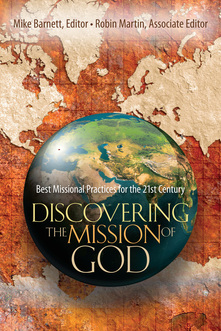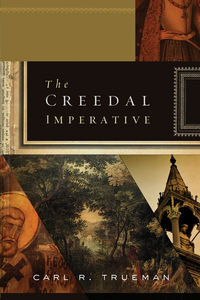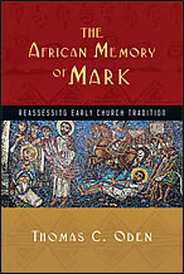posts
 I was encouraged to read today on Andreas Kostenberger's Biblical Foundations blog that he listed Discovering the Mission of God as #3 on his top books of 2012. I could not agree more. Edited by my colleague and dean Mike Barnett and contributed to by other Columbia International University faculty (Alex Luc, Joel Williams, Bryan Beyer, Bill Larkin, Chris Little, and Jerry Rankin), this is an essential book for studying missions today. The volume includes thorough and accessible chapters on the biblical and theological foundations of mission, the history of missions, culture, and practical mission strategies and issues. The book is unique in that it includes chapters from well-known, previously published theologians and missiologists (Chris Wright, John Piper, Ed Stetzer) combined with fresh from the field insights from seasoned practitioners. In this sense, the book captures the essence of missiology--a discipline that wrestles with Scripture, theology, culture, and practice, and one that ultimately collapses without practical engagement in mission. At CIU, we have used Discovering the Mission of God (or DMOG as we like to call it) in both undergraduate and graduate/seminary level courses. Our undergrads (mostly first and second year students) read about half of the book for their missions survey course, while grad students read the entire book as well as other texts. So, I think DMOG works as a great primary text for introductory courses in colleges and seminaries. I could also see it as a great resource for missions organizations in their new candidate orientations and for local churches in their world Christian discipleship efforts. Finally, here's a brief word from the author. The Creedal Imperative is the latest work from Carl Trueman, professor of church history at Westminster Theological Seminary. This work is a timely one for evangelical churches as they seek to guard the good deposit of faith amid many changing and even opposing cultural currents.
A well-written, accessible, and concise work, the book contains six primary chapters. In chapter 1, the author raises the issue of how creeds and confessions are not highly valued especially in the free churches of the West where a "Bible alone" emphasis is often stated. Trueman adds that this anti-creedal perspective is due to a lack of value on the Christian past and confidence in the use of words to communicate Christian belief. Finally, he helpfully argues that ALL Christians have creeds and traditions. The difference is that confessional churches have public creeds, while many free churches have private unstated creeds--but they are creeds nonetheless. With that cultural environment in mind, in chapter 2, the author argues for a biblical basis for creeds (articulated Christian thought) and also the importance of the church as the place where creeds are reflected upon. For instance, he correctly cites Philippians 2:6-11 as a creedal passage in Paul's letter. In chapters 3 and 4, the author offers a helpful summary of the early Christians creeds (from Nicaea to Chalcedon) as well as the Reformed Protestant ones (39 articles, Belgic Confession, Heidelberg Catechism, Westminster Confession, London Baptist Confession). In chapter 5, Trueman reminds the reader that the end of confessional Christianity is not knowledge but doxology. In chapter 6, he summarizes much of the book's earlier thought and argues for the usefulness of creeds and confessions in the life of the church. Following a summarizing conclusion, the author offers a helpful appendix on how to approach revising creeds. There is much to like about this book. As an ordained minister in the free church tradition (Southern Baptist) with training in early Christian studies, I agree that free churches have guiding creeds and traditions that are not explicitly stated but are intuitive to our existence. With that acknowledged, I think that engaging with the inherited tradition from Nicaea through the Reformation ought to provide articulated tracks to answer the big questions of what is the Gospel and how is Jesus Lord? I also agree with the author that all churches are ultimately liturgical. That is, Anglicans, Baptists, and Pentecostals largely have a traditional form of worship, even if some regard themselves as spontaneous. Finally, while correctly noting that evangelicals generally do not appreciate the value of Christian history, Trueman has offered a helpful summary of the early church and Reformation creeds that ought to invoke appreciation and humility in the reader. I do have a few quibbles. First, though the book is concise, it can also be unhelpfully repetitive and some further trimming would have made it more strategic. Second, I think that the noted appendix could have been a chapter itself, especially as the church is tasked with articulating its confessions in updated language and contexts. Finally, as the book is largely focused on the Protestant church in the West, it does lack some direction for how the global church can think through and articulate its confessions in light of diverse cultural realities. A good example of this is Steve Strauss' article "Creeds, Confessions, and Global Theologizing: A Case Study in Comparative Christologies" (in Ott and Netland, eds. Globalizing Theology) as he narrates how the Ethiopian evangelical church has reflected afresh on the doctrine of Christ in a land that historically rejected the Chalcedonian formula. In short, this is an important work for evangelicals desiring to be faithful in doctrine and worship. It is not at all ironic that this book's release coincided with the publication of the "New City Catechism" from Pastor Tim Keller. As I've been reading Carl Trueman's new book The Creedal Imperative this week, I've been encouraged to explore anew some of the classical Protestant confessions, including the Heidelberg Catechism, which was adopted in Germany in 1563.
I was especially impressed by the first question and affirmation in the catechism which addresses the believer's assurance of salvation in Christ. This affirmation, accompanied by supporting Scriptures, is worth our study and continued meditation: 1. Q. What is your only comfort in life and death? A. That I am not my own,[1] but belong with body and soul, both in life and in death,[2] to my faithful Saviour Jesus Christ.[3] He has fully paid for all my sins with His precious blood, and has set me free from all the power of the devil.[5] He also preserves me in such a way[6] that without the will of my heavenly Father not a hair can fall from my head;[7] indeed, all things must work together for my salvation.[8] Therefore, by His Holy Spirit He also assures me of eternal life[9] and makes me heartily willing and ready from now on to live for Him.[10] [1] I Cor. 6:19, 20 [2] Rom. 14:7-9. [3] I Cor. 3:23; Tit. 2:14. [4] I Pet. 1:18, 19; I John 1:7; 2:2. [5] John 8:34-36; Heb. 2:14, 15; I John 3:8. [6] John 6:39, 40; 10:27-30; II Thess. 3:3; I Pet. 1:5. [7] Matt. 10:29-31; Luke 21:16-18. [8] Rom. 8:28. [9] Rom. 8:15, 16; II Cor. 1:21, 22; 5:5; Eph. 1:13, 14. [10] Rom. 8:14. The African Memory of Mark: Reassessing Early Church Tradition by Thomas C. Oden. Downers Grove, IL: Intervarsity Press, 2011, 279 pp., softcover, $22. This review was originally published in the Spring 2012 (pp. 91-93) edition of the Criswell Theological Review.
The African Memory of Mark is the second in a series on books on early African Christianity from Thomas Oden (PhD, Yale), professor emeritus of theology at Drew University. The series publication (all from Intervarsity Press) began in 2008 with the release of How Africa Shaped the Christian Mind, while in late 2011 the third work, Early Libyan Christianity, was published. In addition to serving as the general editor of the Ancient Christian Commentary of Scripture, Oden has been a prolific author, particularly in the area of theology, for nearly a half century. The aim of the present work is to reevaluate the person and role of John Mark—the second Evangelist and missionary companion to Peter and Paul—in light of the memory of the African church. Continuing his practice from How Africa Shaped the Christian Mind, Oden challenges late nineteenth and twentieth century Western historiography and theology that largely discounts the reliability of African accounts and regards Mark as a Palestinian born, Jerusalem based companion of Peter and Paul. In Oden’s methodology, he maintains respect for the Euro-American methodology, while asserting that a fair hearing of the African Coptic tradition of Mark will serve to fill the gaps of our understanding. Aside from Oden’s two other works in this series, there are very few recent works on early African Christianity from such a perspective. The most recent is probably Stephen Davis’ 2004 work The Early Coptic Papacy. After a brief preface and introduction of Mark (chapter 1), the book is divided into five parts. In part one (chapters 2-4), Oden defines African memory—the manner in which African peoples remember and approach history. This includes the body of sources—Coptic liturgy, the martyrdom of St. Mark, and the Coptic histories of Sawirus ibn al-Muqaffa and Anba Shenouda III—that weave together the African Christian narrative. In part two (chapters 5-7), Oden discusses how the biblical portrait of Mark is read within African tradition. In part three (chapters 8-9), the author examines Mark’s missionary work in Africa as well as some key Egyptian sites related to his martyrdom. In part four (chapter 10), Oden considers evidence for an African Mark from textual evidence from the church fathers—both African and non-African. Finally, in part five (chapters 11-13 and a brief conclusion), the author gathers the evidence from the first four sections and offers a closing argument for an African Mark: • Who was born in Cyrene. • Who was possibly a relative of Peter. • Whose mother had a home in Jerusalem that was probably the location of the Last Supper, Pentecost, and, of course where Peter went after his miraculous release from jail (Acts 12). • Whose mother’s house was probably the first New Testament house church. • Who took refuge with Peter in Egypt where “Babylon” (1 Peter 5:13) was actually part of Cairo. • Who was a natural catechist who influenced the development of liturgy in the greater church, and inspired the Alexandrian catechetical school. • Who was a missionary to many parts of the known world and was founder of the church in Africa, particularly Egypt. • Who was martyred in Alexandria. In terms of strengths, Oden has pursued his thesis with characteristic thoroughness but has also written in an accessible manner for the benefit of the broader church. Indeed, the African perspective on Mark is a fresh one and the narrative, summarized above, is quite stimulating and will surely invite reflection and study. Further, Oden’s methodology that acknowledges the place of modern historiography, while also appreciating the African memory approach is refreshing. It is helpful to hear the voices of African scholars and historians regarding Mark, even when they challenge the conclusions of the Western academy. Related, in chapter 4, the author’s summary of the key African literary sources serves as a welcome invitation to the reader to study these in more depth. Similarly, the martyrdom sites and churches described in chapter 9 will aid students doing further research on site in Egypt. What are the book’s weaknesses? First, Oden states that the book is intended in part for “young African scholars and their teachers in the many cultures of the great African continent” (p. 12). While the author is, of course, active in encouraging the work of African scholars, I wonder how many African students will be touched by this book—published on Intervarsity Press and circulated largely in North America and Europe. Is there a special distribution plan for the continent of Africa or perhaps a plan to offer it in digital format? What about Africa’s non-English speakers? Second, Oden chooses to define Africa as a single unified continent and seems to infer that the African memory of Mark is something shared by all Africans (pp. 30-31, 73-76, 81). In reality, what Oden calls an African memory is largely a Coptic memory of Mark and thus it is most meaningful for the churches of Egypt and Ethiopia. Though congregations in the predominantly Christian areas of sub-Saharan African may through study and reflection appreciate Mark’s role in the rise of Christianity in Africa, this narrative is still not their inherited tradition. Moreover, Africa has many Muslims, especially in the North African countries of Egypt and Libya where Mark probably ministered as well as in Morocco, Algeria, and Tunisia where there were Christian communities in the pre-Islamic period. While it is indeed useful to probe this early Christian history in order to enter into respectful dialogue with North African Muslims today, it would be incorrect to say that African Muslims have a Christian memory of Mark. Despite these critiques, I continue to admire the work of Thomas Oden and the attention he is giving to early African Christianity. Though this work may not circulate as widely on the continent of Africa, students (including African students) studying in North America and Europe should read this work in courses related to Patristics and global Christianity, and I could see it serving as a primary text for a seminar on early African Christianity. |
Archives
November 2023
|


 RSS Feed
RSS Feed
